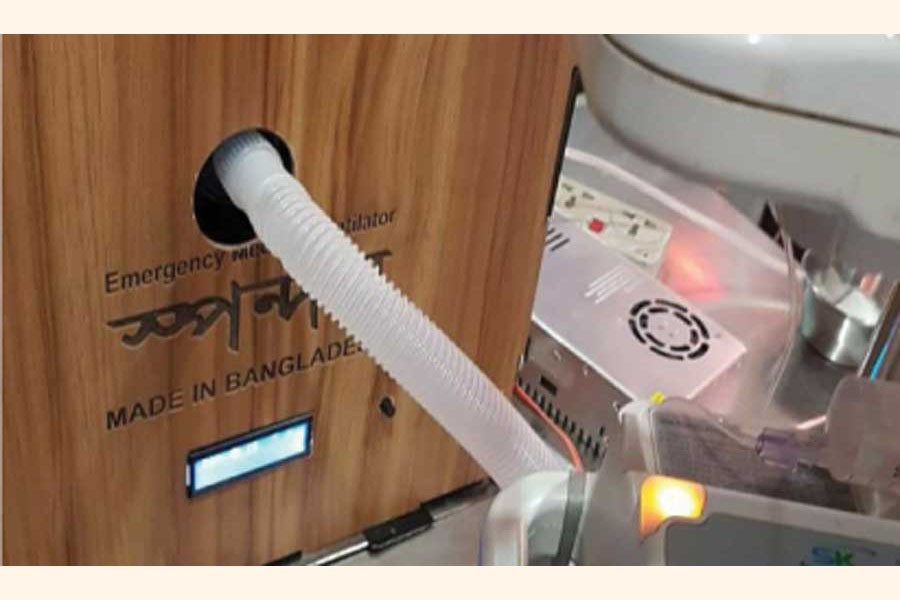Wise men say, "Necessity is the mother of invention." Add humanity and goodwill to that, it is bound to bring amazing result. The recent breakthrough in developing ventilator, a very important medical equipment, using totally indigenous materials and technology is one such example. Dr. Kazi Sifayet Enam Shakkhar and engineer Baized Shuvo, the two young Bangladeshi dreamers have finally materialised their dream that began about a year ago. They have named the ventilator 'Spondon.' So, what is Spondon?
Ventilator is an emergency medical equipment that provides continuous flow of breathable air to those who face respiratory difficulties or somehow become unable to breathe sufficiently. Ventilator is the machine that assists them in breathing, letting air into and out of the lungs mechanically. Patients in emergency condition need such support. However, this life-saving equipment is too expensive to make it available for everyone. That is where the problem begins.
Almost a year ago, during the two-year training of FCPS cardiology trainee programme at Dhaka Medical College, Dr. Shakkhar noticed the severity of the problem. Lion's share of the patients who come to DMCH (Dhaka Medical College Hospital) are very poor and can't afford the expenditure for ICU (intensive care unit). On the other hand, number of ICU beds is inadequate as well which remain filled all the time. Hence, even those who could afford, don't get access. Needless to say, private medicals aren't an option for them. Other patients who come to DMCH from outside Dhaka because of having no ICU facilities in their own areas also suffer as transportation takes hours. As a result, many patients die.
However, Dr. Shakkhar believed that most of the lives could be saved if emergency ICU service was provided. So he along with his cousin Baized started to reflect on the idea of making a ventilator that could provide the most basic service and keep a critical patient alive for 4/5 days before accommodating to a regular one. "Saving some lives was our prime goal," said the optimistic doctor. It was the humane sentiment that pushed him and his cousin to make it possible. Fast forward to 2020, their brainchild is now awaiting a medical certification and to save thousands at this apocalyptic time of Covid-19 pandemic.
Around six months prior today, Dr. Shakkhar and his cousin engineer Baized began making the machine with a basic idea. Their target was to put the most needed features that could serve during emergencies. So they designed the machine with CMV or Continuous Mandatory Ventilation mode which is commonly used to steadily pump oxygen to the patient's lungs. Now the Covid-19 pandemic has made their work even more valuable amid the fear that Bangladesh could also witness a massive outbreak.
Spondon is the final product of a successful team collaboration. Along with Shakkhar and Baized, Asif from BRAC University and Tajbiul from Ahsanullah University worked in the project. A prototype was completed last week and the machine theoretically proved to be successful with plastic lungs check. Currently it is being tested by proper government authorities to be certified to apply on human. With only a few ventilators available for the Covid-19 patients in the country, Spondon could be the saving grace for the country's healthcare system.
Spondon is made with two primary objectives - cheaper price and emergency substitution of standard ventilation. Whereas regular ventilator price starts from a minimum of Tk 500 thousand (5 lakh), Spondon will cost one-fifth or even less of that amount. This will make it affordable to many. And this indigenous ventilator would be capable of providing 3/4 days of service to critical patients before a regular ventilator is arranged. Hence, it gives some extra time to the patients coming from outside Dhaka until finding other alternatives.
If Spondon gets government certification and a proper funding, it will go for a mass production soon. Though the idea began from something else, Covid-19 pandemic has made it somehow more important and more valid as the ultimate goal remains same - saving some lives. The makers now hope to conduct further research on this, if provided with proper financial backup, to bring the price even lower, within Tk 50 thousands only, so that each Upazila and even town hospitals can be equipped with ventilators.
Mohammad Saiful Islam is an MSS student of Mass Communication & Journalism at DU.


